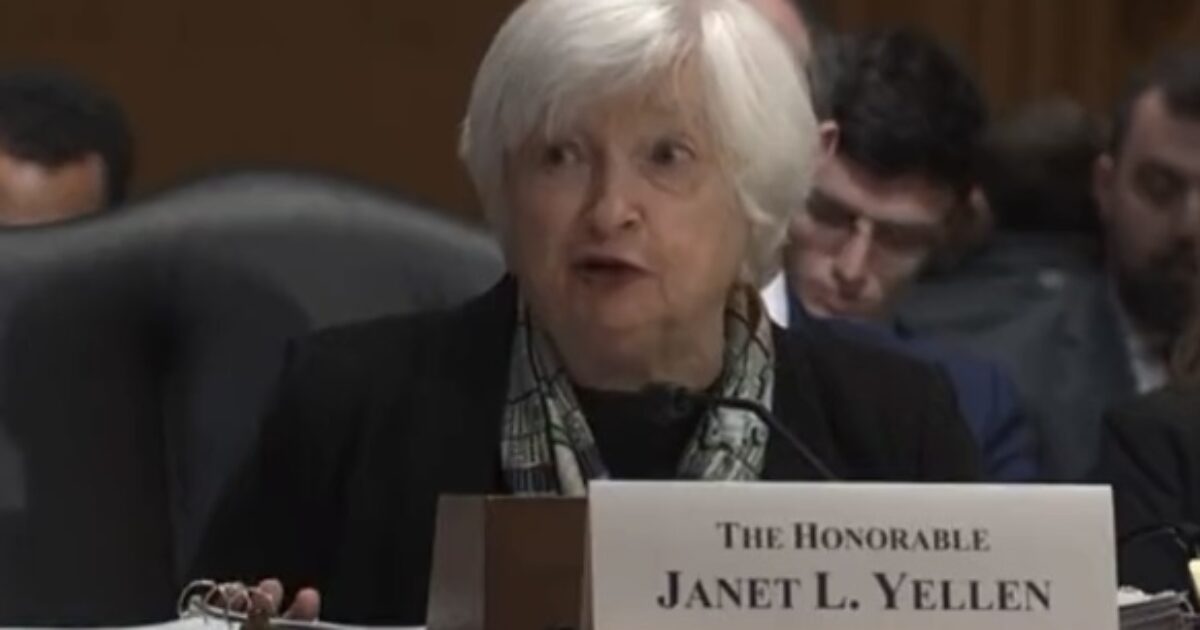U.S. Treasury Secretary Janet Yellen testified Thursday before the Senate Finance Committee.
In her testimony, Yellen admitted that regional banks won’t receive the same bailouts as the “too big to fail” banks.
Is this a warning that bank consolidation, where bigger banks consume smaller banks, will soon arrive?
After Silicon Valley Bank’s collapse, the Federal Reserve and U.S. Treasury caved and said all deposits will be guaranteed – regardless of the $250,000 normal FDIC limit.
"Our banking system remains sound and Americans can feel confident that their deposits will be there when they need them," Yellen said during her testimony.
However, Yellen confirmed that smaller banks aren't guaranteed the same protection for depositors over the FDIC insurance limits of $250,000.
Senator James Lankford (R-OK) pressed Yellen on the issue.
"Will the deposits in every community bank in Oklahoma, regardless of their size, be fully insured now? Are they fully recovered? Every bank, every community bank in Oklahoma, regardless of the size of the deposit, will they get the same treatment that SVBP just got or Signature Bank just got?" Lankford asked.
"A bank only gets that treatment if a majority of the FDIC board, a supermajority, a supermajority of the Fed board, and I, in consultation with the president, determine that the failure to protect uninsured depositors would create systemic risk and significant economic and financial consequences," Yellen responded.
In other words, only the "too big to fail" banks.
Lankford also pressed Yellen on reports that numerous Chinese tech start-ups and venture capitalists invested with Silicon Valley Bank.
"It has been reported publicly that SVB had a large number of Chinese investors that are there, including some that were companies directly connected to the Chinese Communist Party. Will those individuals, companies, entities, and investors that are Chinese investors be made whole based on assessments in my banks in Oklahoma?" Lankford questioned.
"Uninsured investors will be made whole in that bank, and I suppose that could include foreign depositors," Yellen said.
WATCH:
Here is the snippet: pic.twitter.com/85iBeXC0Wn
— Seidler (@SeidlerCorp) March 17, 2023
Here's a Rumble backup courtesy of The Gateway Pundit:
CNBC reported:
Lankford said the impact of this standard would be that small banks would be less appealing to depositors with more than $250,000, the current FDIC insurance threshold.
"I'm concerned you're ... encouraging anyone who has a large deposit at a community bank to say, 'We're not going to make you whole, but if you go to one of our preferred banks, we will make you whole.'"
"That's certainly not something that we're encouraging," Yellen replied.
Members of Congress are currently weighing a number of legislative proposals intended to prevent the next Silicon Valley Bank-type failure.
One of these is an increase in the $250,000 FDIC insurance limit, which several senior Democratic lawmakers have called for in the wake of SVB's collapse.
Following the 2008 financial crisis, Congress raised the FDIC limit from $100,000 to $250,000, and approved a plan under which big banks contribute more to the insurance fund than smaller lenders.
Senator Marco Rubio (R-FL) sent a letter to Treasury Secretary Yellen about the possibility of assets ending up in the hands of foreign adversaries, such as the Chinese Communist Party.
Read the letter below:
As the Department of Treasury continues to respond to the recent closures of Silicon Valley Bank (SVB) and Signature Bank, as well as related, ongoing challenges in the United States economy, I write to urge the department to prioritize United States national security, and, in particular, our geo-economic competition with the People’s Republic of China (PRC), in its response. Specifically, I ask the department to ensure that foreign adversarial regimes, as well as companies subject to their jurisdiction, are unable to exploit this moment for their own material benefit.
First and foremost, as the Federal Deposit Insurance Corporation (FDIC) continues to work to effect an auction of SVB, I request that Treasury ensure that none of its assets end up in the hands of hostile, foreign adversaries – most notably, the PRC, including Hong Kong and Macau. This should include potential buyers whose ownership structure allows undue foreign influence over their operations.
Moreover, I request that the Committee on Foreign Investment in the United States (CFIUS) be prepared to carefully review any covered transactions that result as a part of SVB’s, Signature Bank’s, and others’ potential closures, as well as secondary consequences that come about as a result of these closures. Beijing rarely allows an opportunity to exploit a crisis to pass by, so CFIUS must work diligently to ensure that promising American firms working in critical technologies do not end up acquired by Chinese conglomerates and others.
Furthermore, it is my understanding that SVB was a significant lender to Chinese start-ups, as well. The bank had participated in a joint venture in the PRC with Shanghai Pudon Development Bank, playing an outsized role in funding early-stage Chinese companies. This includes biotech groups and life-sciences technology firms operating in both the United States and the PRC. As the Department of Treasury, in tandem with the Federal Reserve and the FDIC, continues its response, I request information from the Department of Treasury regarding depositors from the PRC, including Hong Kong and Macau, that can expect to receive federal reimbursements from the Deposit Insurance Fund and other federal relief.



Join the conversation!
Please share your thoughts about this article below. We value your opinions, and would love to see you add to the discussion!